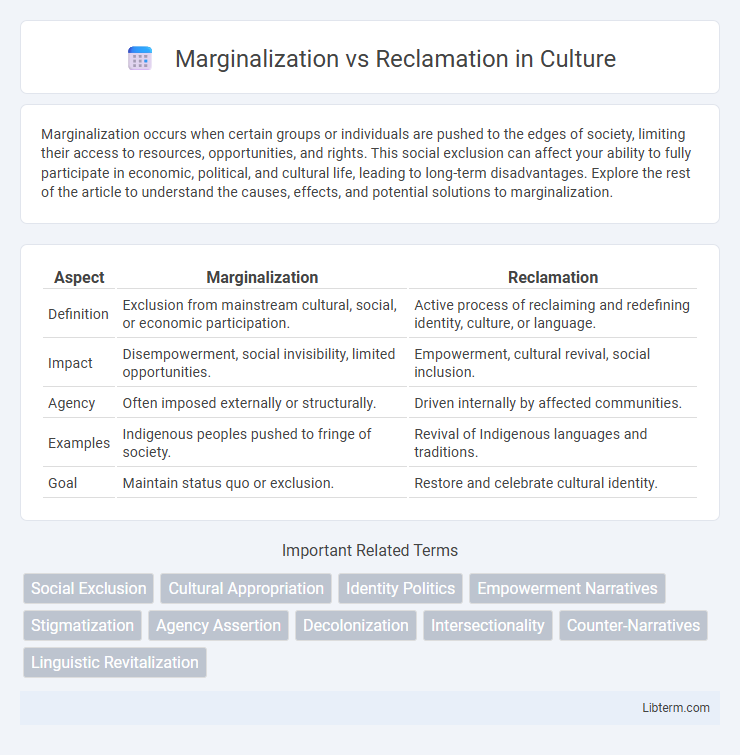Marginalization occurs when certain groups or individuals are pushed to the edges of society, limiting their access to resources, opportunities, and rights. This social exclusion can affect your ability to fully participate in economic, political, and cultural life, leading to long-term disadvantages. Explore the rest of the article to understand the causes, effects, and potential solutions to marginalization.
Table of Comparison
| Aspect | Marginalization | Reclamation |
|---|---|---|
| Definition | Exclusion from mainstream cultural, social, or economic participation. | Active process of reclaiming and redefining identity, culture, or language. |
| Impact | Disempowerment, social invisibility, limited opportunities. | Empowerment, cultural revival, social inclusion. |
| Agency | Often imposed externally or structurally. | Driven internally by affected communities. |
| Examples | Indigenous peoples pushed to fringe of society. | Revival of Indigenous languages and traditions. |
| Goal | Maintain status quo or exclusion. | Restore and celebrate cultural identity. |
Understanding Marginalization: Definitions and Context
Marginalization refers to the systemic exclusion of individuals or groups from meaningful participation in social, economic, and political activities, often based on identity markers such as race, gender, or socioeconomic status. This process results in diminished access to resources, rights, and opportunities, perpetuating inequality and social injustice. Understanding marginalization requires analyzing its structural causes, including institutional discrimination, cultural bias, and historical oppression within various societal contexts.
The Historical Roots of Marginalization
Historical roots of marginalization trace back to systemic exclusion based on race, gender, class, and ethnicity, often embedded in legal codes, social norms, and economic policies. Colonization, slavery, and discriminatory laws institutionalized social hierarchies, perpetuating inequality and limiting access to resources and opportunities. Understanding these origins is crucial for reclaiming marginalized identities and fostering social justice through empowerment and policy reform.
Reclamation: Meaning and Importance
Reclamation refers to the process by which marginalized groups reclaim their identity, culture, language, or history, transforming negative stereotypes into sources of pride and empowerment. This practice plays a crucial role in restoring social justice and fostering a sense of belonging by challenging dominant narratives that have historically oppressed these communities. Understanding reclamation is essential for promoting inclusivity, cultural preservation, and the dismantling of systemic marginalization.
How Marginalization Manifests in Society
Marginalization manifests in society through systemic exclusion from economic opportunities, social services, and political representation, disproportionately affecting minority groups. This exclusion often results in limited access to education, healthcare, and employment, perpetuating cycles of poverty and inequality. Social stigmatization and discriminatory practices reinforce marginalization, isolating communities and restricting their participation in societal decision-making.
The Power Dynamics Behind Marginalization
Marginalization occurs when dominant groups enforce social, economic, or political exclusion to maintain control, systematically suppressing the rights and voices of marginalized communities. Reclamation challenges this imbalance by empowering those communities to assert their identities, narratives, and rights, disrupting power hierarchies. Understanding the power dynamics behind marginalization reveals how institutional structures perpetuate inequality and how reclamation fosters resistance and social transformation.
Strategies of Reclamation: Methods and Movements
Strategies of reclamation involve reclaiming marginalized identities through cultural affirmation, language revitalization, and community-building movements such as Black Lives Matter and Indigenous land rights activism. Methods include creating inclusive art, reclaiming historical narratives, and advocating for policy changes to dismantle systemic oppression. These movements foster empowerment by transforming imposed marginalization into collective strength and social justice initiatives.
Cultural Identity: From Marginalized to Reclaimed
Cultural identity often undergoes transformation through the process of marginalization, where dominant societies suppress or exclude specific cultural groups, eroding their traditions and language. Reclamation involves actively restoring and celebrating these cultural practices, asserting identity through art, language revitalization, and community empowerment. This shift from marginalization to reclamation strengthens social cohesion and affirms the intrinsic value of diverse cultural heritages in a multicultural society.
Challenges in the Reclamation Process
Challenges in the reclamation process include overcoming deeply ingrained social stigmas and systemic barriers that perpetuate marginalization. Efforts to reclaim identity often face resistance from dominant cultural narratives and lack of institutional support, which hinders empowerment and inclusion. Navigating these obstacles requires strategic community engagement and policy advocacy to reshape public perception and access to resources.
Real-World Examples: Case Studies of Marginalization vs. Reclamation
The case of the LGBTQ+ community highlights marginalization through systemic discrimination and social exclusion, while the Stonewall uprising exemplifies reclamation by transforming a site of oppression into a symbol of pride and activism. Indigenous peoples' experiences demonstrate marginalization via cultural erasure and land dispossession; however, the revitalization of native languages and traditions serves as acts of reclamation and cultural resilience. The Black Lives Matter movement addresses ongoing racial marginalization by challenging systemic racism and police brutality, simultaneously reclaiming narratives and spaces through public protests and policy advocacy.
The Future: Bridging Gaps and Sustaining Reclamation Efforts
The future of marginalization vs reclamation centers on bridging social, economic, and cultural gaps by fostering inclusive policies and community-driven initiatives. Sustaining reclamation efforts requires strategic investments in education, representation, and resource allocation to empower marginalized groups and reinforce cultural identities. Collaboration between governments, organizations, and grassroots movements will be crucial in creating equitable systems that dismantle marginalization and support long-term reclamation.
Marginalization Infographic

 libterm.com
libterm.com